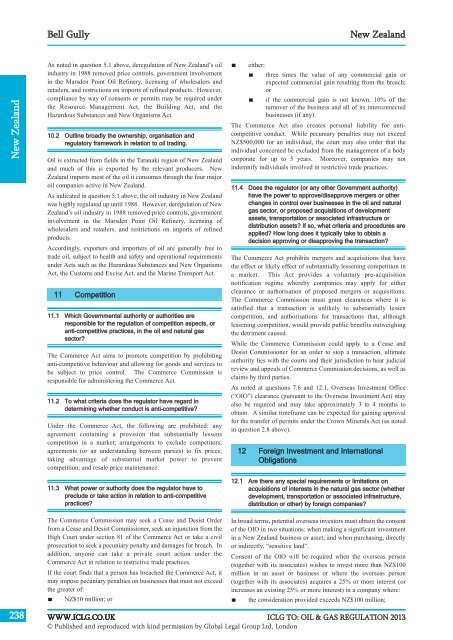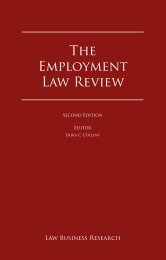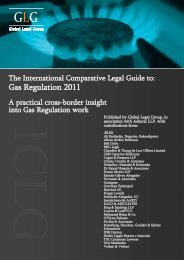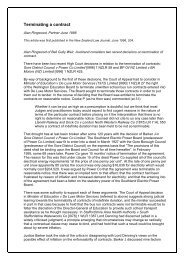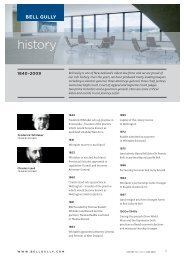Oil & Gas Regulation 2013
NZ Oil & Gas Chapter - The International Comparative ... - Bell Gully
NZ Oil & Gas Chapter - The International Comparative ... - Bell Gully
Create successful ePaper yourself
Turn your PDF publications into a flip-book with our unique Google optimized e-Paper software.
Bell Gully<br />
New Zealand<br />
New Zealand<br />
As noted in question 5.1 above, deregulation of New Zealand’s oil<br />
industry in 1988 removed price controls, government involvement<br />
in the Marsden Point <strong>Oil</strong> Refinery, licensing of wholesalers and<br />
retailers, and restrictions on imports of refined products. However,<br />
compliance by way of consents or permits may be required under<br />
the Resource Management Act, the Building Act, and the<br />
Hazardous Substances and New Organisms Act.<br />
10.2 Outline broadly the ownership, organisation and<br />
regulatory framework in relation to oil trading.<br />
<strong>Oil</strong> is extracted from fields in the Taranaki region of New Zealand<br />
and much of this is exported by the relevant producers. New<br />
Zealand imports most of the oil it consumes through the four major<br />
oil companies active in New Zealand.<br />
As indicated in question 5.1 above, the oil industry in New Zealand<br />
was highly regulated up until 1988. However, deregulation of New<br />
Zealand’s oil industry in 1988 removed price controls, government<br />
involvement in the Marsden Point <strong>Oil</strong> Refinery, licensing of<br />
wholesalers and retailers, and restrictions on imports of refined<br />
products.<br />
Accordingly, exporters and importers of oil are generally free to<br />
trade oil, subject to health and safety and operational requirements<br />
under Acts such as the Hazardous Substances and New Organisms<br />
Act, the Customs and Excise Act, and the Marine Transport Act.<br />
11 Competition<br />
11.1 Which Governmental authority or authorities are<br />
responsible for the regulation of competition aspects, or<br />
anti-competitive practices, in the oil and natural gas<br />
sector?<br />
The Commerce Act aims to promote competition by prohibiting<br />
anti-competitive behaviour and allowing for goods and services to<br />
be subject to price control. The Commerce Commission is<br />
responsible for administering the Commerce Act.<br />
11.2 To what criteria does the regulator have regard in<br />
determining whether conduct is anti-competitive?<br />
Under the Commerce Act, the following are prohibited: any<br />
agreement containing a provision that substantially lessens<br />
competition in a market; arrangements to exclude competitors;<br />
agreements (or an understanding between parties) to fix prices;<br />
taking advantage of substantial market power to prevent<br />
competition; and resale price maintenance.<br />
either:<br />
three times the value of any commercial gain or<br />
expected commercial gain resulting from the breach;<br />
or<br />
if the commercial gain is not known, 10% of the<br />
turnover of the business and all of its interconnected<br />
businesses (if any).<br />
The Commerce Act also creates personal liability for anticompetitive<br />
conduct. While pecuniary penalties may not exceed<br />
NZ$500,000 for an individual, the court may also order that the<br />
individual concerned be excluded from the management of a body<br />
corporate for up to 5 years. Moreover, companies may not<br />
indemnify individuals involved in restrictive trade practices.<br />
11.4 Does the regulator (or any other Government authority)<br />
have the power to approve/disapprove mergers or other<br />
changes in control over businesses in the oil and natural<br />
gas sector, or proposed acquisitions of development<br />
assets, transportation or associated infrastructure or<br />
distribution assets? If so, what criteria and procedures are<br />
applied? How long does it typically take to obtain a<br />
decision approving or disapproving the transaction?<br />
The Commerce Act prohibits mergers and acquisitions that have<br />
the effect or likely effect of substantially lessening competition in<br />
a market. This Act provides a voluntary pre-acquisition<br />
notification regime whereby companies may apply for either<br />
clearance or authorisation of proposed mergers or acquisitions.<br />
The Commerce Commission must grant clearances where it is<br />
satisfied that a transaction is unlikely to substantially lessen<br />
competition, and authorisations for transactions that, although<br />
lessening competition, would provide public benefits outweighing<br />
the detriment caused.<br />
While the Commerce Commission could apply to a Cease and<br />
Desist Commissioner for an order to stop a transaction, ultimate<br />
authority lies with the courts and their jurisdiction to hear judicial<br />
review and appeals of Commerce Commission decisions, as well as<br />
claims by third parties.<br />
As noted at questions 7.6 and 12.1, Overseas Investment Office<br />
(“OIO”) clearance (pursuant to the Overseas Investment Act) may<br />
also be required and may take approximately 3 to 4 months to<br />
obtain. A similar timeframe can be expected for gaining approval<br />
for the transfer of permits under the Crown Minerals Act (as noted<br />
in question 2.8 above).<br />
12 Foreign Investment and International<br />
Obligations<br />
11.3 What power or authority does the regulator have to<br />
preclude or take action in relation to anti-competitive<br />
practices?<br />
The Commerce Commission may seek a Cease and Desist Order<br />
from a Cease and Desist Commissioner, seek an injunction from the<br />
High Court under section 81 of the Commerce Act or take a civil<br />
prosecution to seek a pecuniary penalty and damages for breach. In<br />
addition, anyone can take a private court action under the<br />
Commerce Act in relation to restrictive trade practices.<br />
If the court finds that a person has breached the Commerce Act, it<br />
may impose pecuniary penalties on businesses that must not exceed<br />
the greater of:<br />
NZ$10 million; or<br />
12.1 Are there any special requirements or limitations on<br />
acquisitions of interests in the natural gas sector (whether<br />
development, transportation or associated infrastructure,<br />
distribution or other) by foreign companies?<br />
In broad terms, potential overseas investors must obtain the consent<br />
of the OIO in two situations: when making a significant investment<br />
in a New Zealand business or asset; and when purchasing, directly<br />
or indirectly, “sensitive land”.<br />
Consent of the OIO will be required when the overseas person<br />
(together with its associates) wishes to invest more than NZ$100<br />
million in an asset or business or where the overseas person<br />
(together with its associates) acquires a 25% or more interest (or<br />
increases an existing 25% or more interest) in a company where:<br />
the consideration provided exceeds NZ$100 million;<br />
238 WWW.ICLG.CO.UK<br />
ICLG TO: OIL & GAS REGULATION <strong>2013</strong><br />
© Published and reproduced with kind permission by Global Legal Group Ltd, London


